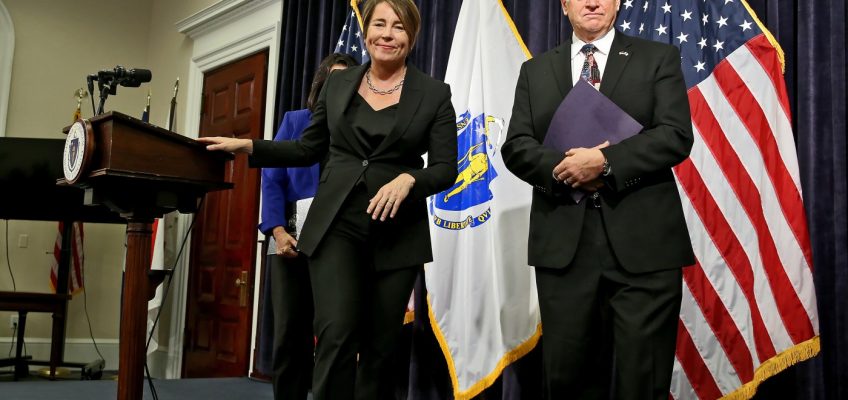A trio of housing policy and law groups said Friday they are “deeply concerned” with Gov. Maura Healey’s plan to limit capacity in the state’s emergency shelter system, which state officials have used to temporarily house migrants and homeless families.
Healey said Monday the state will limit the number of families in the shelter system to 7,500 and place those who cannot fit onto a waiting list, raising the possibility that some could end up without a place to sleep as colder weather starts to set in. The state could hit that limit by the end of the month, Healey said.
The state’s right-to-shelter law requires officials to provide temporary housing to families with children and pregnant women, including migrants who arrive in Massachusetts. The Massachusetts Coalition for the Homeless, Massachusetts Law Reform Institute, and Citizens’ Housing and Planning Association said the state “must continue to uphold that right.”
“We are particularly worried that the Healey-Driscoll administration’s plan to create a waiting list for emergency assistance shelter will limit the right to shelter, leave families with children with no safe alternatives, and place additional pressure on service providers, nonprofit agencies, and municipalities,” the three organizations wrote in a statement.
Once the shelter system reaches 7,500 families, Healey said, the state will not guarantee temporary housing to families who arrive in the state. There were 7,089 families in the system as of Thursday, with 3,624 at traditional sites, 3,376 in hotels and motels, and 89 in temporary sites, according to a state dashboard that is updated daily.
But what happens to families after that point is unclear and some have raised legal questions about whether the administration cannot guarantee placement, including House Speaker Ronald Mariano.
A Healey spokesperson said Tuesday the state is not ending the right-to-shelter law and “will continue to place eligible families into shelter as units become available.”
“We are making clear that our system has reached capacity and we do not have enough shelter space, service providers or funding to continue to safely or responsibly expand. We also continue to advocate for federal funding,” spokesperson Karissa Hand said in a statement.
Healey has for months called on the federal government to provide more funding for Massachusetts to pay for shelter services.
Healey applauded President Joe Biden Friday for including a $1.4 billion request for the Department of Homeland Security’s Shelter and Services Program, which Boston and the state received $1.9 million from earlier this year to expand shelter and transportation services for newly-arrived migrant families.
“President Biden’s $1.4 billion request for the DHS Shelter and Services Program is urgently needed for states like Massachusetts that are experiencing historic surges in migrant arrivals, and we appreciate the Biden Administration’s acknowledgement that these funds need to be distributed more equitably. Congress must pass this supplemental funding in full as quickly as possible,” Healey said in a statement.
The three organizations said they “fear” ceasing efforts to expand capacity and limiting shelter entries “may result in children and families being unable to access shelter when it is needed the most.”
“We know that shelter expansion cannot be the only response. Next week, we will share a broad set of recommendations that we believe can ease the current crisis, uphold the safety and dignity of people in the greatest need, and provide long-term housing solutions to alleviate the housing crisis,” the organizations said.
Those recommendations, the groups said, will touch on helping families move out of temporary shelter programs and into permanent, affordable housing; strengthening homelessness prevention resources; expanding services for newly-arrived migrant families; and bringing “key stakeholders to the table and uplift the experiences and expertise of families and communities most affected by the crisis.”
The number of families living in emergency shelters is more than twice the amount the state was sheltering a year ago, Healey said Monday. That includes 23,000 people spread out across 90 cities and towns at hundreds of locations like traditional shelters, hotels and motels, college dorms, and a military base.
Lynn, Boston, Worcester, and Springfield were the only cities in Massachusetts with more than 200 families enrolled in emergency shelter programs as of Thursday, according to the state dashboard.
Healey said the state neither has the space, service providers, nor funds “to safely expand beyond 7,500 families.”
“But especially with winter approaching, we need everyone to understand that we are entering a new phase of this challenge. We can no longer guarantee shelter placement for families who are sent here,” Healey said Monday as she outlined new programs she argued would help people transition out of temporary housing.
Speaking to reporters Tuesday, Mariano questioned whether Healey has the authority to place a capacity limit on the emergency shelter system.
“What happens if someone shows up? What does she do? We haven’t got a clear answer for that. If there is no place to put them, where do they go?” he said.


Leave a Reply